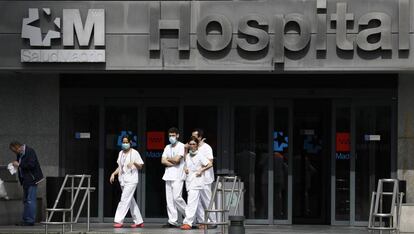Spain exceeds 1,000 coronavirus deaths with no clear idea if peak is close
“The worst days are on their way,” warned Health Minister Salvador Illa on Friday

With more than a thousand coronavirus deaths and clear signs of overload in various parts of the country’s health network, Spain has begun to enter the darkest phase so far of the ongoing coronavirus. The fact that no one can say how long this stage will last is perhaps the hardest thing to deal with, but there are also many other questions left to answer. Not even the central Health Ministry, which is coordinating the response to the crisis, has been able to clarify whether the rapid tests to diagnose the disease, which were supposed to be ready by the end of this week, are already operational and in which quantities. “In the coming days,” Minister Salvador Illa has repeated when asked about them.
“The worst days are on their way,” Illa said on Friday morning, explaining that the rise of cases is continuing with no clear evidence whether the state of alarm and total lockdown put in place by the central government last week is having the desired effect of halting the spread of the SARS-CoV-2 coronavirus. “We must keep up our efforts,” added Fernando Simón, the director of the Health Ministry’s Coordination Center for Health Alerts. “We have to achieve this and we have to achieve it as soon as possible.”
The latest figures supplied by officials on Friday put the number of deaths at 1,002, which was 30% up on the date just 24 hours before
The latest figures supplied by officials on Friday put the number of deaths at 1,002, which was 30% up on the date just 24 hours before. The number of patients in intensive care had also risen by 21.5%, to a total of 1,141. These indicators are key to monitoring the progress of the pandemic in Spain, given that, as Simón admitted yesterday, “it is very likely” that the data does not reflect the real rate of infections given the lack of testing for suspected cases.
Once the figures from the regions were included on Friday night, the updated totals were 1,094 deaths and 21,750 infections.
Madrid is still the epicenter of the coronavirus outbreak in Spain, although other provinces such as La Rioja and Álava in the north of the country have a greater rate of cases in relation to their total population. The number of deaths in the Madrid region yesterday rose by 130 people in just 24 hours. That is 55% of the total in Spain, although this percentage is starting to fall as the number of deaths in other regions rises.
Experts say that another great unknown yet to be resolved is whether the isolation measures arrived in time
Catalonia, with 3,270 cases and 85 deaths, and the Basque Country, with 1,465 cases and 71 deaths, are following in the wake of Madrid in absolute terms.
Experts say that another great unknown yet to be resolved is whether the isolation measures arrived in time, which will determine whether regions with fewer cases will be less affected by the spread of the virus, or whether it will still arrive, albeit later than in other areas.
Without knowing whether the peak of the epidemic is close, the Health Ministry is unsure of which successful models of dealing with the crisis it should be looking at. One of these could be Germany, which, with 14,000 cases already diagnosed, has managed a mortality rate of 0.2%, in contrast with the 5% rate in Spain and the 8% rate in Italy.
“I can’t explain it,” said Simón on Friday when asked about the figures from Germany. “We are making an effort to understand what is happening [in that country],” he added. “It’s a difficult situation to understand, on a global level.”
English version by Simon Hunter.
Tu suscripción se está usando en otro dispositivo
¿Quieres añadir otro usuario a tu suscripción?
Si continúas leyendo en este dispositivo, no se podrá leer en el otro.
FlechaTu suscripción se está usando en otro dispositivo y solo puedes acceder a EL PAÍS desde un dispositivo a la vez.
Si quieres compartir tu cuenta, cambia tu suscripción a la modalidad Premium, así podrás añadir otro usuario. Cada uno accederá con su propia cuenta de email, lo que os permitirá personalizar vuestra experiencia en EL PAÍS.
¿Tienes una suscripción de empresa? Accede aquí para contratar más cuentas.
En el caso de no saber quién está usando tu cuenta, te recomendamos cambiar tu contraseña aquí.
Si decides continuar compartiendo tu cuenta, este mensaje se mostrará en tu dispositivo y en el de la otra persona que está usando tu cuenta de forma indefinida, afectando a tu experiencia de lectura. Puedes consultar aquí los términos y condiciones de la suscripción digital.









































